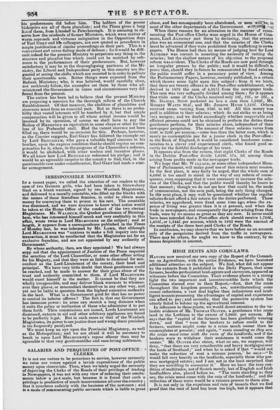SALARIES AND PERQUISITES OF POST-OFFICE.!
CLERKS.
IT is not our nature to be penurious to service, however earnestly we raise our voices against a lavish expenditure of the public money upon sinecurists. Thus, when we lately urged the necessity of depriving the Clerks of the Roads of their privilege of trading in Newspapers, it was not with any view of reducing their emolu- ments below a ju-t scale, but because it is found that such a privilege-is productive of much inconvenience all over theeountry ; that it interferes unfairly with the business of the newsmen ; and is a mode of remunerating public servants which is liable to great
abuse, and has consequently been abandoned, or 'soon- willbe, in most of the other departments of the Government. 100i.
When these reasons for an alteration in the manner of remu- nerating the Post-office Clerks were urged in the House of Com- mons, Lord ALTHORP met them by declaring, that the present plan was an economical one, and that the salaries of the Clerks must be advanced if they were prohibited from trafficking in news- papers. The House had then no means of judging how far Lord ALTHORP was correct in asserting the necessity of raising the salaries; but the shallow nature of his objection to the proposed reform was evident. The Clerks of the Roads are now paid through an irregular process by the public; and it would be difficult to prove that, should they in future be remunerated by fixed salaries, the public would suffer in a pecuniary point of view. Among the Parliamentary Papers, however, recently published, is a return which throws some light upon this subject : from it we learn, that there are twenty officers in the Post-office establishment, who
derived in 1832 the sum of 4,957/. from the newspaper trade. This sum was very unNually divided among them ; for it appears that while some of the Clerks received only 101., 12/., or 20/., a Mr. DANIEL STOW pocketed no less a sum than 1,200/., Mr. ROBERT WATTS 964/., and Mr. JOSEPH HUME 1,159/. 'Others
received sums varying from 2301. to 40/. All this money was paid in addition to their salaries; which do not strike us as being very meagre; and we doubt exceedingly whether respectable and efficient persons could not be obtained to perform the duties these gentlemen perform, for their salaries alone, independent of their newspaper perquisites. The amount of these salaries varies from
550/. to 250/. per annum,—none less than the latter sum, which is surely no contemptible pay for a junior clerk in the Post-office : in the Bank of England, it would be considered handsome remu- neration to a clever and experienced clerk, who found good se- curity for the faithful discharge of his trust. It appears also from the return, that eight Clerks of the Roads in the Dublin Post-office divide 1,659/. 17s. 3d. among them arising from profits made in the newspaper trade. We hope that Mr. WALLACE, or some other independent Mem- ber of Parliament, will make good use of this return next session. In the first place, it may fairly be urged, that the whole sum of 6,600/. is too small to stand in the way of any reform of conse- quence, even supposing that it were necessary to increase the sala- ries of the Clerks, and that the public would thereby be losers to that amount ; though we do not see how that could be, the mode of remuneration, not the sum paid, being the only thing changed. In the next place, it may well be questioned whether the regular salaries do ndt afford a fair return for the duties performed. l hese salaries, we apprehend, were fixed some time ago, when the ex- pense of living was greater than it is at present, and when the trade in newspapers, and consequently the profits arising from that trade, were by no means so great as they are now. It never could have been intended that a Post-office clerk should receive 1,7501., -1,459/., or 1,344/. per annum, which in 1832 were the amount of the receipts of the three best-paid Clerks of the Roads.
In conclusion, we may observe that we have before us an account only of the perquisites derived from the traffic in newspapers. There may be others, for aught we know to the contrary, by no means despicable in amount.


















 Previous page
Previous page